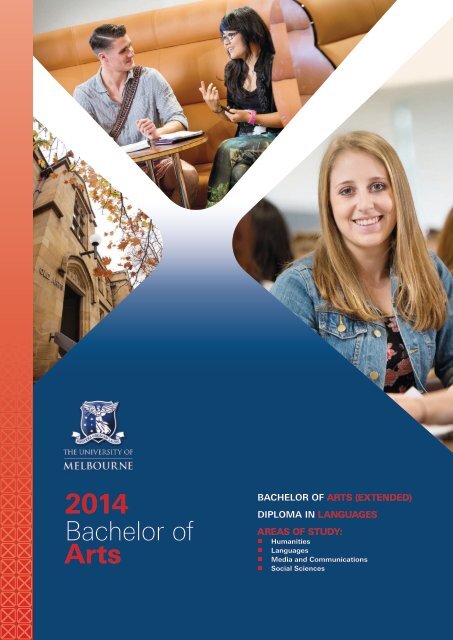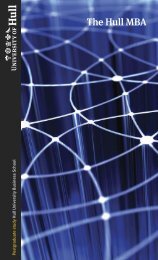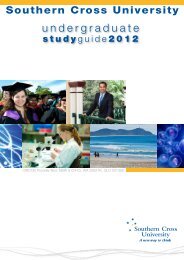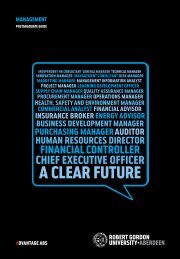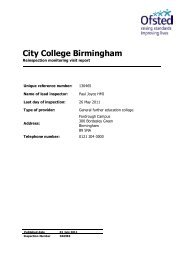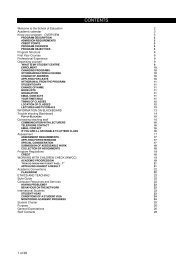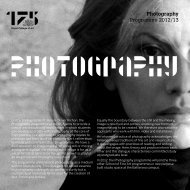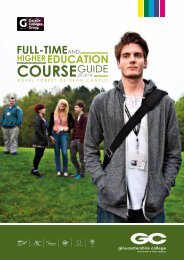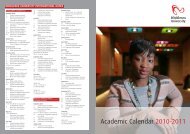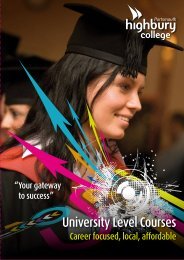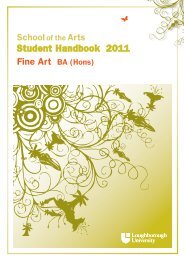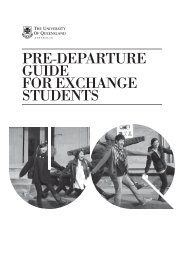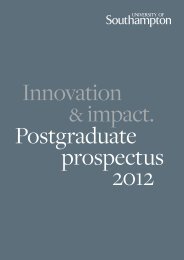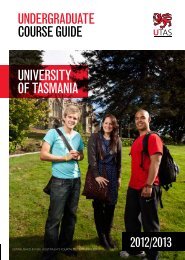2014 Bachelor of Arts - Future Students - University of Melbourne
2014 Bachelor of Arts - Future Students - University of Melbourne
2014 Bachelor of Arts - Future Students - University of Melbourne
Create successful ePaper yourself
Turn your PDF publications into a flip-book with our unique Google optimized e-Paper software.
ContentsFoundational knowledge andcritical thinking for life3<strong>Bachelor</strong> <strong>of</strong> <strong>Arts</strong> 4Apply your learning in the real world 7A career with a difference 8<strong>Arts</strong> majors 9<strong>Arts</strong> minors 14Honours 15<strong>Bachelor</strong> <strong>of</strong> <strong>Arts</strong> (Extended) 16Chancellor’s Scholars Program 17Diploma in Languages 18Other concurrent diplomas 19Graduate study 20Entry requirements 22Admissions 23Contact us#28 in the world#1in AustraliaBack coverOur inspiring graduatesChoosing to study at <strong>Melbourne</strong> is your first step towards an excitingcareer. You’ll join the ranks <strong>of</strong> thousands <strong>of</strong> inspiring leaders inthe humanities and social sciences who began their journey at<strong>Melbourne</strong>. Among them are:• Australian political leaders such as the first female Prime Minister<strong>of</strong> Australia, Julia Gillard, and former Australian Ambassador toJapan Mr Murray McLean OAM• Journalists including Michelle Grattan, Jana Wendt, AFL reporterSamantha Lane and Malaysian TV presenter Siow Hui Mei• Entertainers such as Wouter ’Wally’ De Backer (Gotye),Myf Warhurst and Faustina ’Fuzzy’ Agolley• Celebrated authors including Alex Miller and Christos Tsiolkas• Australian cultural identities such as Germaine Greer andManning Clark• <strong>University</strong> Chancellors and Vice-Chancellors.Times Higher EducationWorld <strong>University</strong>Rankings 2012–20138672-OffAdm.<strong>2014</strong>CourseBrochure<strong>Arts</strong>27May.indd 24/06/13 3:09 PM
Foundational knowledgeand critical thinking for lifeKick-start your inspiring and flexible career with our <strong>Bachelor</strong> <strong>of</strong> <strong>Arts</strong> –one <strong>of</strong> Australia’s most popular degrees.FLEXIBILITYOur innovative and flexible curriculumlets you tailor your degree to matchyour career goals.CHOICEChoose your areas <strong>of</strong> specialisationfrom over 30 study areas, includinglanguages, history, psychology,economics, and media andcommunications.AIM HIGHERPerform at your best among high-achievingstudents from around the world in one<strong>of</strong> Australia’s most popular degrees.FIRST-YEAR FOUNDATIONSLearn new academic skills andexperience a range <strong>of</strong> study disciplinesin first year through our unique <strong>Arts</strong>Foundation subjects.DIVERSE OPPORTUNITIESAccess diverse career opportunities bygaining vital skills that are transferableacross industries and pr<strong>of</strong>essions.GLOBAL CITIZENSHIPDevelop an international perspectivethrough language study and enjoyopportunities to study overseas.The Faculty <strong>of</strong> <strong>Arts</strong>:150+ years<strong>of</strong> teaching andresearch excellenceYou will have access to the new <strong>Arts</strong> and Music Student Centre, where you canget course advice from staff or meet other students to collaborate on projects8672-OffAdm.<strong>2014</strong>CourseBrochure<strong>Arts</strong>27May.indd 34/06/13 3:09 PM
<strong>Bachelor</strong> <strong>of</strong> <strong>Arts</strong>The <strong>Bachelor</strong> <strong>of</strong> <strong>Arts</strong> <strong>of</strong>fers unique flexibility and anopportunity to focus on one or two majors in the fields<strong>of</strong> humanities, social sciences and languages.Duration3 years full timePart time available QFourth year honours availableCampusParkvilleQUICK FACTSContact hours (first year) W10–14 hours per weekExtra requirementsSome language subjects require apr<strong>of</strong>iciency test prior to enrolment.Q Part-time study is not available tomost international students due tovisa restrictions.W Based on full-time study load and mayvary depending on subjects taken. Youare also expected to undertake at leastfour hours <strong>of</strong> independent or groupstudy for every contact hour.MORE INFOEntry requirementsSee page 22 for details13MELB (13 6352)13MELB@unimelb.edu.auba.unimelb.edu.autwitter.com/gshssyoutube.com/gshssmelb<strong>Melbourne</strong> <strong>Arts</strong>:the most populardegree in VictoriaVictorian Tertiary AdmissionsCentre 2013A DEGREE THAT OPENS DOORSThe <strong>Bachelor</strong> <strong>of</strong> <strong>Arts</strong> (BA) <strong>of</strong>fers morethan 30 study areas, available as majorsand minors. You can build a degreethat broadens your education and helpsyou to discover your true interests andpotential, before entering the workforceor pursuing a graduate qualification.The degree builds vital skills that can beapplied to a wide range <strong>of</strong> careers andstudy pathways, while allowing you t<strong>of</strong>ollow your passion. As a <strong>Melbourne</strong> <strong>Arts</strong>student, you will build interdisciplinaryknowledge, community leadership skillsand cultural awareness, graduating withthe skills necessary to succeed in therapidly changing global workplace.Overseas study options includestudent exchange at one <strong>of</strong> ourprestigious partner universitiesand short-term overseas intensivesubjects. You can also participate inaccredited study overseas, and obtainvocational experience in community orpr<strong>of</strong>essional organisations.WHAT DO I STUDY?The <strong>Bachelor</strong> <strong>of</strong> <strong>Arts</strong> requires thesuccessful completion <strong>of</strong> 24 subjects –300 points in total, with subjectsusually worth 12.5 points each. You willcomplete eight subjects, or 100 points<strong>of</strong> study, in each <strong>of</strong> the three year levels.First yearIn the first year, you will complete atleast one <strong>Arts</strong> Foundation subjectfrom a choice <strong>of</strong> six. These subjectsintroduce central <strong>Arts</strong> concepts, ideasand principles to assist in your academictransition to the <strong>University</strong>, and enableyou to make informed study choices forthe remainder <strong>of</strong> your degree.Second yearBy the second year you will havea better understanding <strong>of</strong> the <strong>Arts</strong>disciplines <strong>of</strong>fered and be able t<strong>of</strong>inalise your selection <strong>of</strong> majors andminors. In the second year, you willcomplete the second-year subjects inyour major/s.Third yearIn third year, you will have theopportunity to engage in a capstoneexperience, which is designed to drawtogether the various strands <strong>of</strong> yourundergraduate study and prepare youfor life as a graduate.I’m convinced Imade the rightdecision!“ When it came to VTACChange <strong>of</strong> Preference, I wastossing up between studyinga BA at the <strong>University</strong> <strong>of</strong><strong>Melbourne</strong> and doing an<strong>Arts</strong>/Law degree at anotheruniversity. For me it camedown to <strong>Melbourne</strong>’s worldrenownedreputation, locationand the flexibility it wouldafford me to spread my wingsand try new things. “Rachel Withers<strong>Bachelor</strong> <strong>of</strong> <strong>Arts</strong>Major in Media andCommunicationsPresident <strong>of</strong> the <strong>Melbourne</strong><strong>Arts</strong> Student Society30 + subjectareas4 coursesearch.unimelb.edu.au8672-OffAdm.<strong>2014</strong>CourseBrochure<strong>Arts</strong>27May.indd 44/06/13 3:09 PM
MAJORS AND MINORSA major or minor is a group <strong>of</strong> subjectswithin a specialised area <strong>of</strong> study. Amajor generally comprises 100 points<strong>of</strong> study (eight subjects), while a minoris usually 75 points (six subjects). In the<strong>Bachelor</strong> <strong>of</strong> <strong>Arts</strong>, you can complete:• One major, or• Two majors, or• A major and a minor.The sample course plans, opposite,show how you can structure yourdegree around these options.You can study any <strong>of</strong> the followingdisciplines as a major or a minor:• Ancient World Studies• Anthropology• Arabic• Art History• Asian Studies• Australian Indigenous Studies• Chinese• Classics• Creative Writing• Criminology• Economics• English and Theatre Studies• French• Gender Studies• Geography• German• Hebrew and Jewish Studies• History• History and Philosophy <strong>of</strong> Science• Indonesian• Islamic Studies• Italian• Japanese• Linguistics and Applied Linguistics• Media and Communications• Philosophy• Politics and International Studies• Psychology• Russian• Screen and Cultural Studies• Sociology• Spanish and Latin American Studies.You can study any <strong>of</strong> the followingdisciplines as a minor only:• Chinese Studies• Development Studies• English Language Studies• Environmental Studies• European Studies• Knowing and LearningE• Law and Justice• Social Theory.See pages 9–14 for descriptions <strong>of</strong> each<strong>of</strong> the majors and minors.Sample course plan – <strong>Bachelor</strong> <strong>Arts</strong> with one major QMajor in JapaneseYear 1Year 2Year 3Semester 1 Japanese 1Semester 2 Japanese 2Semester 1 Japanese 3Semester 2 Japanese 4Semester 1 Japanese 5Semester 2 Japanese 6InternationalPoliticsThe WorldSince WorldWar IITerrorism:ShiftingParadigmsIntroduction toJapaneseCommunicationSign andSymbols inJapaneseLanguage andIdentityLanguageLaw in SocietyMedia andEveryday Lifein AsiaLanguage,Society andCultureCrimes <strong>of</strong> thePowerful<strong>Arts</strong> Internship<strong>Arts</strong> Foundation subjects Major subjects Elective subjects Breadth subjectsWSample course plan – <strong>Bachelor</strong> <strong>Arts</strong> with two majorsQMajors in Asian Studies and HistoryYear 1Year 2Year 3Semester 1PowerSemester 2 RepresentationSemester 1Semester 2Semester 1Semester 2Human Rightsin China andEast AsiaContemporaryJapanGreat Empires<strong>of</strong> IslamicCivilisationIdentity,Ideology andNationalism inAsia (capstone)Language andPower in AsianSocietiesThe History <strong>of</strong>NowChineseStudies: Cultureand EmpireThe USA andthe World:Democracy andEmpireThe ModernMiddle EastChinesePolitics andSocietyMyth, Art andEmpire: Greeceand RomeInternationalPoliticsRebels andRevolutionariesMigrant Nation:Culture andIdentityRace inAmericaMaking History(capstone)<strong>Arts</strong> Foundation subjects Major subjects: Asian Studies Major subjects: HistoryElective subjects Breadth subjectsWSample course plan – <strong>Bachelor</strong> <strong>Arts</strong> with a major and a minor QMajor in Philosophy and minor in Development StudiesYear 1Year 2Year 3Semester 1Semester 2Semester 1Semester 2Semester 1Semester 2Philosophy:The BigQuestionsAboriginalitiesScience,Reason andRealityEthical TheoryKnowledge andRealityThe Philosophy<strong>of</strong> Philosophy(capstone)ReasonFrom Plato toEinsteinNietzsche andCriticsDevelopmentin the 21stCenturyAsian andComparativePhilosophyAfrica:Environment,Development,People<strong>Arts</strong> Foundation subjects Major subjects Minor subjectsElective subjects Breadth subjectsWThe DevelopingWorldFamine: TheGeography <strong>of</strong>ScarcityWorking withValueCommunityVolunteeringfor ChangePower,Ideology andInequalityThe Rise<strong>of</strong> ModernScience,1500–1750Generatingthe Wealth <strong>of</strong>NationsInterculturalEffectivenessHuman Rightsand GlobalJusticeAustralia in theWine WorldLeadingChange in aComplex WorldKnowledge,Learning andCulturePrinciples <strong>of</strong>Business LawJazz: TheImprovisatorySpiritUrban HistoryPrivacy Lawand SocialNetworksDrugs thatShape SocietyWork and theLawNaturalEnvironmentsUrbanEnvironmentsHumanBehaviour andEnvironmentLeaves toLandscapeOwning Ideas:Creation,Innovation andLawPositiveCommunitiesandOrganisationsQ This is a sample course plan only. Subjects <strong>of</strong>fered may change from year to year. You will beadvised <strong>of</strong> current subject <strong>of</strong>ferings prior to subject selection and enrolment.W You must complete at least four breadth subjects, plus another two subjects either as breadth orfrom your core studies. For details on breadth, see page 6.E Subject to Academic Board approval<strong>Arts</strong>coursesearch.unimelb.edu.au 58672-OffAdm.<strong>2014</strong>CourseBrochure<strong>Arts</strong>27May.indd 54/06/13 3:09 PM
Apply your learning in the real worldOur internship, workplace and overseas subjects can help you gain practicalexperience, build valuable career networks and experience new cultures.ba.unimelb.edu.au/enrichINTERNSHIPS<strong>Arts</strong> internship subjectThis unique subject allows you togain real-world experience at aleading organisation. Through your80-hour work placement and writtenassessment, you’ll have the chanceto apply your university learnings topractical situations, and make valuableconnections with employers. You willalso learn more about the types <strong>of</strong> rolesavailable after graduation, which willhelp you make future career decisions.Community Volunteeringfor ChangeThis subject gives you the opportunityto broaden your academic experienceby getting involved in communityvolunteering projects and workplacements. You will spend theequivalent <strong>of</strong> around one day per week(80 hours minimum) during semester asan intern in a not-for-pr<strong>of</strong>it organisation.This gives you the opportunity toapply knowledge and skills acquiredduring your course to address issues <strong>of</strong>significance to the community.Discipline-specific internshipsubjectsSpecific internships are available tostudents studying majors in Criminology,Sociology, and Politics and InternationalStudies. Places are limited and areusually awarded to high achievers.Criminology and Sociologyinternships:• Sociology Internship• Socio-legal studies workplace visits• Law, Justice and Social ChangePolitics and International Studiesinternships:• Parliamentary Internship• Public Affairs Internship• Uni-Capitol Washington CongressInternshipFIELDWORK SUBJECTOur <strong>Arts</strong> fieldwork subject, OnCountry Learning: Indigenous Studies,enables you to go into a real researchenvironment in the field and gainvaluable skills and training. You can takethis subject if you’re studying Politicsand International Studies or AustralianIndigenous Studies.OVERSEAS INTENSIVESUBJECTSThese subjects give you an amazingopportunity to study in another country,and gain an international perspective anda competitive edge. If you’re studying alanguage, immersing yourself in a newculture can dramatically improve yourlanguage skills.Places are limited and can <strong>of</strong>ten becompetitive.Art History travel subjects:• Art Fieldwork• Contemporary Culture (available aspart <strong>of</strong> fourth-year honours)History travel subjects:• The Graeco-Roman City in Antiquity• Venice Cultures <strong>of</strong> ConsumptionChina travel subject:• Intensive Chinese Program: ChinaItaly travel subjects:• Contemporary Italy: Study Abroad• The Story <strong>of</strong> Italian: Study AbroadFrance travel subject:• Paris: Ville Lumiere (on site in Paris)Apply your learning in the real worldTake aninternshipsubject at anon-pr<strong>of</strong>it organisationDown and dirty with practicalsummer archaeologyWant to become an archaeologist? You’ll need to learn some hands-onskills such as surveying, excavation and artefact analysis. That’s where thesummer intensive subject ‘Practical Archaeology’ comes in. It gives you achance to get your hands dirty on a real-life dig site at a historic homesteadin <strong>Melbourne</strong>, and will introduce you to some <strong>of</strong> the fieldwork, scientificand interpretative methods involved in working as an archaeologist.The subject was developed in collaboration with pr<strong>of</strong>essional consultingarchaeologists and heritage agencies, as well as representatives fromAboriginal Affairs Victoria and Heritage Victoria.coursesearch.unimelb.edu.au 78672-OffAdm.<strong>2014</strong>CourseBrochure<strong>Arts</strong>27May.indd 74/06/13 3:09 PM
A career with a difference<strong>Melbourne</strong> <strong>Arts</strong> graduates enjoy challenging andrewarding careers in a diverse range <strong>of</strong> industries,both locally and abroad.WORKPLACE SKILLSOur graduates find that studying arange <strong>of</strong> disciplines across their <strong>Arts</strong>degree equips them with flexiblethinking skills and opens up an array <strong>of</strong>career opportunities. Each major willgive you specialised skills in a certaindiscipline or field, but all our majorswill give you the following skills andattributes essential in the workplace:• Problem-solving skills – applicablein the workplace for issuesmanagement, consultancy, planning,people management and diplomacy• Excellent written and oralcommunication skills – vital for anyposition <strong>of</strong> leadership, influence orinnovation• Analytical and planning skills andknowledge – necessary for anyrole that requires planning, riskmanagement or project management• Understanding <strong>of</strong> cultural diversity –important for careers in internationalrelations, community development,translating and diplomacy• Ability to think creatively andinnovatively – essential for roles inmarketing and advertising, logistics,publishing and editing, consultancyand planning• Ethical leadership skills.PATHWAYS TO GRADUATESTUDY<strong>Bachelor</strong> <strong>of</strong> <strong>Arts</strong> graduates can completefurther study at graduate level, throughcoursework or research programs.Programs at the Graduate School<strong>of</strong> Humanities and Social Sciencesallow students to develop advancedknowledge in a selected disciplineand acquire pr<strong>of</strong>essional skills for arewarding and meaningful career.Specialised programs are also <strong>of</strong>feredby other graduate schools at the<strong>University</strong> <strong>of</strong> <strong>Melbourne</strong>.See pages 20–21 for more information.#9in the world forgraduate employabilityJoin our graduates atsome <strong>of</strong> the world’s mostinfluential organisations:- ANZ- Australian government- Fairfax newspapers- IBM- Lonely Planet- United Nations- World VisionWHERE ARE OUR ARTSGRADUATES NOW?<strong>Melbourne</strong> <strong>Bachelor</strong> <strong>of</strong> <strong>Arts</strong> graduateshave diverse skills which enable themto work in a wide range <strong>of</strong> occupations,depending on where their passions,experience and opportunities take them.Some <strong>of</strong> the entry-level positions takenup by recent graduates include:• <strong>Arts</strong> administrator• Business consultant• Communications <strong>of</strong>ficer• Conservator• Editor• Electronic and desktop publisher• Executive <strong>of</strong>ficer• Media adviser• Policy <strong>of</strong>ficer• Project manager• Research assistant• Student adviser• Technical writer• Training coordinator• Travel writer.For more information about graduatedestinations, visit:ba.unimelb.edu.au/pathways/graduate_destinations.htmlA momentwith TracySun, Editor<strong>of</strong> 588MagazineThe application processfor the key position at<strong>Melbourne</strong>’s largest Chineselanguage magazine was highlycompetitive, but <strong>Arts</strong> alumniTracy Sun felt prepared. Duringher degree she focused ongetting her work published,even though she usuallywasn’t paid for her time, whichmeant she could demonstrateexperience and enthusiasmduring her interview.“During my studies I was head<strong>of</strong> the Chinese Publisher’sGroup at the <strong>University</strong>, andhelped to make a magazinewith fellow students. I alsoworked at Australian ChineseDaily,” she said.Tracy believes students shoulduse their time at universityto find out what they enjoyand to work out their ownidentity – one that is uniqueand will help them find a placein the competitive job market.QS World <strong>University</strong> Rankings 20128 coursesearch.unimelb.edu.au8672-OffAdm.<strong>2014</strong>CourseBrochure<strong>Arts</strong>27May.indd 84/06/13 3:09 PM
<strong>Arts</strong> majorsA major is a group <strong>of</strong> subjects within a particularstudy area. You can choose up to two majors asthe focus <strong>of</strong> your degree. Read more about themajors available on the following pages.ANCIENT WORLD STUDIESAncient World Studies is the study <strong>of</strong>Classical Greece and Rome, as wellas Egypt and the Near East, from3000 BCE to the 4th century CE.You can choose a variety <strong>of</strong> subjectstreams, which combine the study<strong>of</strong> ancient languages and texts intranslation (such as myth, literature,history and philosophy) with the study<strong>of</strong> archaeology, art and architecturalmonuments. You can focus on aparticular time period, geographic region,technical specialisation (such as myth orceramics) or thematic area <strong>of</strong> study.Career paths include archaeology,classics teaching, curatorship, tourism,librarianship and archival work, andacademic research.ANTHROPOLOGYAnthropology is the study <strong>of</strong> themany societies and cultures <strong>of</strong> theworld and their complex interaction.Anthropology’s global scope iscomplemented by a local focus,and a unique perspective gainedby participation in the daily life andlanguage <strong>of</strong> the communities studied.Contemporary social anthropologyasks broad and detailed questionsabout what it means to be human in aglobalised world, as well as providinga critical vantage point from which toreflect on ourselves and others.Career paths include archaeology,history, academia, sociology,government and consultancy.ARABICThe Arabic program <strong>of</strong>fers an integratedway <strong>of</strong> studying Arabic language andaspects <strong>of</strong> Arab and Islamic culture.Beyond studying the language itself, youalso have the opportunity to learn aboutthe nature <strong>of</strong> living, seeing, acting andinteracting in the ’Arab way’. You willdevelop language pr<strong>of</strong>iciency, as wellas awareness <strong>of</strong> issues related to Arabicliterature, history, sociology and religion.Career paths include internationalrelations, diplomacy, communitydevelopment, translation,communications and government.ART HISTORYThe <strong>University</strong> <strong>of</strong> <strong>Melbourne</strong> isthe premier provider <strong>of</strong> art historyeducation in Australia. Thematic andinterdisciplinary subjects deal withthe theories <strong>of</strong> art history, art and themarket, prints and other issues. Areas<strong>of</strong> specialisation include late antiquity,medieval, renaissance, baroque,18th and 19th century European art,modernism and postmodernism,contemporary art, Indigenous Australianart and international art.Career paths include art curatorship, artspromotion, arts management, history,arts policy and communications.ASIAN STUDIESKnowledge <strong>of</strong> Asia is a crucial assetat this time <strong>of</strong> rapid globalisationand social change. Our AsianStudies program is one <strong>of</strong> thelargest in Australia and comprises acomprehensive range <strong>of</strong> subjects inthe intellectual, cultural, political andreligious traditions <strong>of</strong> Asia, with afocus on China, Indonesia, Japan andSouth East Asia. Asian Studies subjectsare taught in English and do notrequire language prerequisites. Studyabroad programs and opportunities toparticipate in events and activities withan Asian focus are available.Career paths include internationalrelations, diplomacy, communitydevelopment, communications andgovernment.See the course plan on page 5.AUSTRALIAN INDIGENOUSSTUDIESThe Australian Indigenous Studiesmajor <strong>of</strong>fers unique perspectives onAboriginal and Torres Strait Islanderhistories and culture. Themes includeIndigenous cultural production, keythinkers and concepts, settler andIndigenous environmental ethics,Aboriginal women and colonialism,Indigenous health, and issues relatingto land, law and philosophy.Career paths include communitydevelopment, policy, sociology andgovernment.CHINESELearn to speak one <strong>of</strong> the mostimportant languages in the world. Bytaking Chinese language you can learnabout the history and contemporaryculture <strong>of</strong> one <strong>of</strong> Australia’s mostimportant trade and cultural partners.As a Chinese speaker you wouldbecome eligible for many newemerging employment opportunities.You will be placed in an appropriateclass level according to your ability andbackground in the language.Career paths include internationalrelations, diplomacy, communitydevelopment, translation,communications and government.CLASSICSIn this major, you will study thelanguages <strong>of</strong> Ancient Greek and Latin,exploring ancient culture through theliterature <strong>of</strong> ancient Greece and Romein the original languages. You willprogress through one or both <strong>of</strong> theselanguages from beginner through toadvanced levels.Career paths include teaching andacademia, government, policydevelopment, public service,librarianship and archival work, andheritage consultancy.#1 in Victoria#13 in the worldFor English Languageand LiteratureQS World <strong>University</strong> Rankings by Subject 2013<strong>Arts</strong> majorscoursesearch.unimelb.edu.au 98672-OffAdm.<strong>2014</strong>CourseBrochure<strong>Arts</strong>27May.indd 94/06/13 3:10 PM
CREATIVE WRITINGThis major lets you explore yourcreative potential and extend yourwork to avant-garde, cross-genre andexperimental forms <strong>of</strong> writing. You willcritically test the creative potential andinfluence <strong>of</strong> contemporary theoreticaland philosophical schools <strong>of</strong> thoughtin all forms <strong>of</strong> writing. Areas <strong>of</strong>specialisation include fiction, poetry,poetics, non-fiction, performance andwriting for theatre, and autobiography.Teachers in the creative writingprogram include award-winning writers.Career paths include writing, publishing,editing, corporate communications andmarketing.CRIMINOLOGYCriminology is the study <strong>of</strong> humanbehaviour and explores the motivationsbehind criminal activities. It drawsknowledge and perspectives froma range <strong>of</strong> disciplines such as law,sociology, psychology, psychiatry andhistory. Criminologists work in a widerange <strong>of</strong> fields including policy, crimeprevention, corporate and white-collarcrime, business regulation, drug policyand consumer and environmentalprotection. Increasingly, criminologistsalso study the ways cultures depictcrime, whether in newspapers,television and other mass media or infilms, novels and art.Career paths include legal advising,policing, policy development, sociology,defence and government.ECONOMICSEconomics is essential to modern life,because it seeks to understand, assessand explain the mechanisms <strong>of</strong> marketsand national economies. The Economicsmajor builds problem-solving skills thatare applicable to careers in businessand government. It will teach you howto analyse and interpret data and equipyou with the tools to find smart solutionsfor the numerous problems confrontinggovernments and the commercial world.Three areas <strong>of</strong> study are available withinthe main discipline: microeconomics,macroeconomics and econometrics,and quantitative methods. <strong>Students</strong> whowish to pursue a major in Economicsthrough the <strong>Bachelor</strong> <strong>of</strong> <strong>Arts</strong> degree are required to meet the mathsprerequisites as determined by theFaculty <strong>of</strong> Business and Economics.See page 22 for more details.Career paths include human resources,project management, marketing andcommunications, management andconsultancy.ENGLISH AND THEATRESTUDIESEnglish and Theatre Studies is acombined program, and you canspecialise in either area. It <strong>of</strong>fers studiesin imaginative writing and dramaticperformance, focusing on their formsand traditions, and on the myriadways they engage with the everydayworld. The program <strong>of</strong>fers subjectsin a wide range <strong>of</strong> fields, from themedieval to romanticism, modernism,postmodernism and beyond. Thisincludes British, Australian, Americanand postcolonial writing and theatre, andliterary, cultural and performance theory.Career paths include authorship,publishing, arts management, corporatecommunications, cinema management,and marketing.FRENCHFrench is one <strong>of</strong> the world’s majorinternational languages. It is spoken byover 200 million people in 43 countries,on five continents. A knowledge <strong>of</strong>French may increase access to careersin international relations, developmentstudies, business, science and the arts.The overall objective <strong>of</strong> the Frenchprogram is to teach you to processinformation from a wide variety <strong>of</strong>materials in French, both written andspoken, and to produce accounts anddiscussions <strong>of</strong> that information in avariety <strong>of</strong> forms.Career paths include internationalrelations, diplomacy, communitydevelopment, translation,communications and government.Sample course plan – <strong>Bachelor</strong> <strong>Arts</strong> QMajors in Economics and Media and CommunicationsYear 1Year 2Year 3Semester 1Semester 2Semester 1Semester 2Semester 1Semester 2PowerLanguageUnderstandingAustralianMediaNet CommunicationsPerspectives inGlobal MediaCulturesIntroductionto CinemaStudiesThe Secret Life<strong>of</strong> LanguageIntroduction toMedia WritingCognitivePsychologyWritingJournalismPerception,Memory andCognitionAn abundance<strong>of</strong> options!“ I’m glad to be at universitybecause my social horizonshave expanded a lot and I havegained more independencein the academic system. I likebeing able to choose subjectsI like and to set my timetableinstead <strong>of</strong> having it set outfor me. ”Exxy Chen<strong>Bachelor</strong> <strong>of</strong> <strong>Arts</strong>First yearQuantitativeMethods 1Law in SocietyQuantitativeMethods 2Criminal Lawand PoliticalJusticeBasicEconometricsGlobalCriminologyIntroductoryMicroeconomicsIntroductoryMacroeconomicsIntermediateMacroeconomicsIntermediateMicroeconomicsMarketingCommunicationsMicroeconomicsMacroeconomics<strong>Arts</strong> Foundation subjects Major subjects: EconomicsMajor subjects: Media and Communications Elective subjects Breadth subjectsWQ This is a sample course plan only. Subjects <strong>of</strong>fered may change from year to year. You will beadvised <strong>of</strong> current subject <strong>of</strong>ferings prior to subject selection and enrolment.W Due to the structure <strong>of</strong> the Economics major, six subjects must be allocated to the breadthcomponent <strong>of</strong> the degree.10 coursesearch.unimelb.edu.au8672-OffAdm.<strong>2014</strong>CourseBrochure<strong>Arts</strong>27May.indd 104/06/13 3:10 PM
GENDER STUDIESGender Studies considers the effect<strong>of</strong> gender and sexuality on a range <strong>of</strong>discourses embedded within cultures,identities and global histories. Graduatespossess exceptional skills in creativeand critical thinking, textual and visualanalysis, and writing and communication.The training you will receive in the role<strong>of</strong> gender in everyday life and in globalcultures also provides crucial preparationfor dealing with the gendered nature <strong>of</strong>the workplace. Subjects consider ideasabout sexual difference, sexual politicsand sexuality through close engagementwith a broad variety <strong>of</strong> theorists, casestudies and media.Career pathways include sociology,community development, policydevelopment, government, academiaand research.GEOGRAPHYGeography examines the dynamicrelationships between societies andenvironments. It is a globally focuseddiscipline that seeks to understand thecomplex connections between peopleand place in order to work towards amore equitable world. Field classes inAustralia and overseas <strong>of</strong>fer studentsthe opportunity to explore and examinegeographical issues and problems firsthand.Career paths include consulting, policy,biodiversity conservation, climatechange mitigation and adaptation,disaster risk management, internationaldevelopment, natural resourcemanagement, rural and urban planning,and sustainable urban development.GERMANGerman has more than 100 million nativespeakers and is one <strong>of</strong> the most popularlanguages worldwide. A knowledge <strong>of</strong>German opens up the rich culture <strong>of</strong>German-speaking Europe as well as itshistory, philosophy, literature, musicand scientific traditions. The Germanprogram has a proud history <strong>of</strong> morethan half a century at the <strong>University</strong> andprovides the opportunity to completepart <strong>of</strong> your studies overseas throughscholarships and exchange programs.You will be placed in an appropriateclass level according to your ability andbackground in the language.Career paths include internationalrelations, diplomacy, communitydevelopment, translation,communications and government.HEBREW AND JEWISHSTUDIESThe Hebrew and Jewish Studiesprogram <strong>of</strong>fers an unparalleledopportunity to study the development<strong>of</strong> Jewish civilisation, Israeli history andculture, and the Hebrew language. TheHebrew and Jewish Studies programinvestigates the history, literature,archaeology, philosophy, ethnographyand social theory <strong>of</strong> Jewish societyand culture. You will engage incontemporary debates about ethnicityand identity, assimilation, exile andDiaspora cultures.Career paths include internationalrelations, diplomacy, communitydevelopment, translation, teaching, andreligious and community work.HISTORYThe History curriculum <strong>of</strong>fers you theopportunity to understand the worlds <strong>of</strong>the past, to reflect on the making <strong>of</strong> thepresent, and to develop the capacitiesto locate information, analyse evidence,think critically and communicateeffectively. The discipline <strong>of</strong>fers bothgreat range and detailed attention toparticular places, times and themes.Courses extend from the medievalworld to the great empires, to our mostimmediate past. All <strong>of</strong>ferings reflectthe latest developments in historicalresearch and vocational practice.Career paths include teaching andacademia, government, policydevelopment, public service,librarianship and archival work, andheritage consultancy.See the course plan on page 5.HISTORY AND PHILOSOPHYOF SCIENCEThe aim <strong>of</strong> History and Philosophy <strong>of</strong>Science is to understand science – howit works, its historical development andits function in modern society. Historyand Philosophy <strong>of</strong> Science integratesphilosophical, historical and sociologicalapproaches to the study <strong>of</strong> science. Youwill gain analytical skills in evaluatingscientific (and non-scientific) knowledgeas well as a broad understanding <strong>of</strong> thehistorical development <strong>of</strong> science in itsinteractions with philosophy, religionand society.Career paths include history, sociology,government, teaching, academia andresearch.An agent forpositive change“ The highlight for me wasstudying cultural geography,which goes into thephilosophy <strong>of</strong> how and whyhumans interact with theenvironment. Since graduatingI have founded Polykala, anot-for-pr<strong>of</strong>it social enterprisethat delivers training to newlyarrived asylum seekers,refugees and migrants onenvironmental awareness,community leadership andyouth empowerment. ”Ananth Gopal<strong>Bachelor</strong> <strong>of</strong> <strong>Arts</strong> (Honours)Major in GeographyINDONESIANLearn the language <strong>of</strong> one <strong>of</strong> Australia’sclosest neighbours. By learningIndonesian you will open up manyinteresting employment opportunitiesin Indonesia and with the manyorganisations who work with thecountry’s population <strong>of</strong> over 200 million,including the Australian Government.You will be placed in an appropriateclass level according to your ability andbackground in the language.Career paths include internationalrelations, diplomacy, communitydevelopment, translation,communications and government.ISLAMIC STUDIESIslam is one <strong>of</strong> the fastest-growingreligions in the world, embracedby around one-fifth <strong>of</strong> the world’spopulation. Through the Islamic Studiesprogram, you will study the development<strong>of</strong> Islamic thought and Muslimsocieties from a broad multidisciplinaryperspective. Islamic Studies addressesthe issues relevant to the development <strong>of</strong>Islam as a religion and civilisation fromits origins to the present.<strong>Arts</strong> majorsCareer paths include internationalrelations, diplomacy, communitydevelopment, communications,government and policy development.coursesearch.unimelb.edu.au 118672-OffAdm.<strong>2014</strong>CourseBrochure<strong>Arts</strong>27May.indd 114/06/13 3:10 PM
ITALIANStudy Italian language and culturein one <strong>of</strong> Australia’s leading Italianlanguage programs. Learn the language<strong>of</strong> a culturally rich country to help withyour own travel, and learn how Italyhas influenced Australian art, foodand lifestyle. You will be placed in anappropriate class level according to yourability and background in the language.Career paths include internationalrelations, diplomacy, communitydevelopment, translation,communications and government.JAPANESEOur Japanese program is one <strong>of</strong> thelargest in Australia. The languagesubjects, taught at a range <strong>of</strong> levelsfrom beginner to advanced, aredesigned to maximise acquisition <strong>of</strong>the language and to develop yourcommunication skills in varioustypes <strong>of</strong> texts, interactional contextsand strategic aspects <strong>of</strong> meaningmaking.You will also develop a broadunderstanding <strong>of</strong> cultural, social andhistorical aspects <strong>of</strong> Japan.Career paths include internationalrelations, diplomacy, communitydevelopment, translation,communications and government.See the course plan on page 5.#1 in Australia#14 in the worldFor Communication andMedia StudiesQS World <strong>University</strong> Rankings by Subject 2013LINGUISTICS AND APPLIEDLINGUISTICSLinguistics is the study <strong>of</strong> language inall its aspects, including its structure,its diversity, how it changes andevolves, how people learn and makeuse <strong>of</strong> it to communicate, and how it isimplicated in relations <strong>of</strong> power. Thismajor will give you an insight into themost fundamental <strong>of</strong> all human faculties,developing strong analytical skills and afoundation for work in diverse areas.Career paths include translation,teaching, language assessment, research,communications and consultancy.See the course plan on page 13.MEDIA ANDCOMMUNICATIONSThe study <strong>of</strong> Media and Communications<strong>of</strong>fers you foundational knowledge forthe 21st century. It equips you with acritical understanding <strong>of</strong> the constantlychanging global media environmentsand technologies, and provides coreresearch and pr<strong>of</strong>essional skills valuedacross a range <strong>of</strong> media sectors. A widearray <strong>of</strong> subjects is available, coveringkey developments in media industriesand new communication technologies,and their effect on politics, societyand culture.Career paths include journalism,publishing, public relations, marketing,communications and mediamanagement.See the course plan on page 10.PHILOSOPHYPhilosophy is the study <strong>of</strong> the mostfundamental aspects <strong>of</strong> reality and value.Every area <strong>of</strong> inquiry and endeavour –from art and history through politics andeconomics to biology and mathematics– generates philosophical issues aboutour world and our place in it. Workin philosophy involves the creative,critical task <strong>of</strong> constructing, clarifyingand comparing ideas. We dig into thefundamental assumptions beneath oureveryday views, to see how they hangtogether, how they can be improved, orhow we might have reason to prefer oneover another.Career paths include analysis andresearch, policy development, educationand training, ethics, communications andacademia.See the course plan on page 5.POLITICS ANDINTERNATIONAL STUDIESThe Politics and International Studies majorgives you an understanding <strong>of</strong> the mainpolitical issues, institutions, ideas andactors that dominate the local, nationaland international agenda. It exploresthe relationships between countries andregions, and the international system as awhole. The wide range <strong>of</strong> issues and topicscovered includes globalisation, regionalism,environmental politics, American powerand diplomacy, and international relations.Career paths include internationalrelations, diplomacy, multinationalbusiness, politics, policy developmentand government.Studying relevant,real-world topics“ Choosing to specialise in Mediaand Communications came asa result <strong>of</strong> my natural affinity forwriting and a fascination withhow new technologies and mediacoverage affect our lives. ”Jack Palazzo<strong>Bachelor</strong> <strong>of</strong> <strong>Arts</strong>Major in Media andCommunications12 coursesearch.unimelb.edu.au8672-OffAdm.<strong>2014</strong>CourseBrochure<strong>Arts</strong>27May.indd 124/06/13 3:10 PM
Sample course plan – <strong>Bachelor</strong> <strong>Arts</strong> QMajors in Psychology and Linguistics and Applied LinguisticsYear 1Year 2Year 3Semester 1Semester 2Semester 1Semester 2Semester 1Semester 2PSYCHOLOGYMind, Brain andBehaviour 1Mind, Brain andBehaviour 2DevelopmentPsychologyPersonalityand SocialPsychologyResearchMethods forHuman InquiryPsychologicalScience:Theory andPracticeTaught at the <strong>University</strong> since the late1800s, psychology is intellectuallyfascinating and has direct applicationsto everyday life. As a discipline, itembraces a wide range <strong>of</strong> perspectivesand approaches that contribute to thescientific study and understanding <strong>of</strong>behaviour, especially human behaviour.If you would like to work as a registeredpsychologist in Australia you willneed to complete the AustralianPsychology Accreditation Council(APAC)-accredited major sequence,as illustrated in the sample courseplan. This leads to further study, afterwhich you can become an accreditedpsychologist. To complete an accreditedmajor, you must complete 10 subjects,including two as breadth.Career paths include psychologypractice, community health,government and human behaviour.IdentityAboriginalitiesPhoneticsSecondLanguageLearning andTeachingSemanticsAdvancedStudies<strong>of</strong> HumanCognitionRUSSIANUnderstandingSocietyThe Secret Life<strong>of</strong> LanguageCognitivePsychologySyntaxFirst LanguageAcquisitionExploringLinguisticsDiversity(capstone)Critical Thinkingwith DataSeeing: TheWhole PictureBiologicalPsychologyDangerousEarth<strong>Arts</strong> InternshipThe Psychopathology<strong>of</strong>Everyday Life<strong>Arts</strong> Foundation subjects Major subjects: PsychologyMajor subjects: Linguistics and Applied Linguistics Elective subjects Breadth subjectsWQ This is a sample course plan only. Subjects <strong>of</strong>fered may change from year to year. You will beadvised <strong>of</strong> current subject <strong>of</strong>ferings prior to subject selection and enrolment.W You must complete at least four breadth subjects, plus another two subjects either as breadth orfrom your core studies. For details on breadth, see page 6.Russia is and will continue to be one<strong>of</strong> the world’s largest political powers.Speakers <strong>of</strong> Russian can betterunderstand the place <strong>of</strong> this rich anddiverse country and where it is placedin politics, economics and culture. Youwill be placed in an appropriate classlevel according to your ability andbackground in the language.Career paths include internationalrelations, diplomacy, communitydevelopment, translation,communications and government.SCREEN AND CULTURALSTUDIESThis major embraces a wide range<strong>of</strong> material: film and popular media;screen histories; Australian, Hollywoodand arthouse cinemas; everydaylife; television and entertainment;ethnographic and documentary cinema;computer games; the internet; andthe representation <strong>of</strong> global cultures.It <strong>of</strong>fers subjects about the nature andhistory <strong>of</strong> film and cultural studies. Theseinclude such issues as film and screenaesthetics, identity and gender, sexualityand spectatorship, the nature <strong>of</strong> narrativestructures and class ideologies.Career paths include art curatorship,sociology, government and academia.SOCIOLOGYSociology explores issues related tocontemporary families, gender relations,ethnic, racial and sexual identity, andthe body, through to media, newtechnologies and globalisation. You willlearn about patterns <strong>of</strong> social inequalityand new forms <strong>of</strong> social problems, andthe ways in which people and societiesconfront these new challenges.Career paths include sociology,community development, policydevelopment, government, academiaand research.SPANISH AND LATINAMERICAN STUDIESAs a student <strong>of</strong> Spanish, you will learnto speak the language <strong>of</strong> more than25 countries and 350 million people.Subjects cover the culture and histories<strong>of</strong> the largest Spanish-speaking nationsand how the language has influencedcultures around the world. By learningsuch a popular and influential language,you will create a wide range <strong>of</strong> newcareer opportunities. Exchangeopportunities in Spanish-speakingcountries are available.Career paths include internationalrelations, diplomacy, communitydevelopment, translation,communications and government.<strong>Arts</strong> majorscoursesearch.unimelb.edu.au 138672-OffAdm.<strong>2014</strong>CourseBrochure<strong>Arts</strong>27May.indd 134/06/13 3:10 PM
<strong>Arts</strong> minorsA minor is a group <strong>of</strong> subjects within a particularstudy area, and is taken alongside your major.Any <strong>of</strong> the majors listed on pages 9–14can be studied as minors, as well as thedisciplines outlined below (which areavailable only as minors).CHINESE STUDIESThe Chinese Studies minor focuseson the cultural, political and religioustraditions <strong>of</strong> China.DEVELOPMENT STUDIESDevelopment Studies addressesprocesses <strong>of</strong> social, economic, politicaland cultural change in the global south.This minor allows you to critically examineprocesses <strong>of</strong> managed change in thedeveloping world, giving you the skillsto intervene in such processes. Throughthis program, you will better understandthe nature <strong>of</strong> policies and relationshipsat local, national and international levelsthat have shaped poverty, inequalityand insecurity in the contemporaryworld. We examine themes such asdebt and global poverty, environmentalsustainability, the relationship betweencitizens and the state, culture and humanrights, globalisation, national sovereignty,gender inequity, social exclusion, healthand migration.See the course plan on page 5.ENGLISH LANGUAGESTUDIESEnglish Language Studies enhanceseffective use <strong>of</strong> the most widelyused language in the world. You willdevelop an understanding <strong>of</strong> the history<strong>of</strong> English, its subtle and intricategrammar, and the status <strong>of</strong> its manysocial and geographical varieties.ENVIRONMENTAL STUDIESThis versatile minor enables you togain practical and relevant experiencethrough laboratory work, groupprojects and field trips, includingopportunities for fieldwork researchin China. Environmental Studiescombines knowledge <strong>of</strong> naturalenvironments with an understanding<strong>of</strong> how human societies work. Itanalyses environmental management,biogeography and sustainability.EUROPEAN STUDIESEuropean Studies is a cross-disciplinaryprogram that looks at Europeanculture, society and languages. Youwill complete core European Studiessubjects and can also take subjectsfrom areas such as history, literarystudies, languages, philosophy, politicsand art history.KNOWLEDGE ANDLEARNING QThe Knowledge and Learning minorallows you to examine the ways inwhich differing forms <strong>of</strong> knowledgeare constructed, produced, managedand disseminated. You will discover thelearning processes that support this ina range <strong>of</strong> social, historical and politicalcontexts.LAW AND JUSTICEIn this minor you will examine thecapacity and power <strong>of</strong> law to deliverjustice in a range <strong>of</strong> social, historicaland political contexts. A key focus is theorigins and effects <strong>of</strong> law's processes.SOCIAL THEORYSocial Theory analyses the organisationand transformations <strong>of</strong> societies andcultures. It questions the everydayassumptions that shape our lives andconsiders such issues as the division <strong>of</strong>power and the nature <strong>of</strong> identity.Opened my eyes todifferent options“ Not knowing exactly what Iwant to do as a career meantthe <strong>University</strong> <strong>of</strong> <strong>Melbourne</strong>suited me best as I could tryout lots <strong>of</strong> different subjectswhile maintaining a focus onPsychology with the possibility<strong>of</strong> graduate studies. ”Nellie Montague<strong>Bachelor</strong> <strong>of</strong> <strong>Arts</strong>Majors in Psychology andApplied LinguisticsDiploma in Languages (French)Q Subject to Academic Board approval14 coursesearch.unimelb.edu.au8672-OffAdm.<strong>2014</strong>CourseBrochure<strong>Arts</strong>27May.indd 144/06/13 3:10 PM
HonoursAn honours year will help you develop research andanalytical skills, and is a great way to prepare for workor further study.ba.unimelb.edu.au/pathways/honours.htmlHonours is a fourth year <strong>of</strong> study takenon completion <strong>of</strong> your undergraduatedegree. It brings together the theory andpractical skills gained in your bachelorsdegree, and allows you to developadvanced skills in:• Research• Analysis• Problem solving• Critical and creative thinking• Communication.The main component <strong>of</strong> yourhonours year is the completion <strong>of</strong> anindependent research thesis under theguidance <strong>of</strong> an academic supervisor.CAREER OUTCOMESHonours improves future careerprospects and opens up a broad range<strong>of</strong> opportunities. Honours graduatesare in high demand from employersbecause <strong>of</strong> their outstanding research,analytical and communication skills andproven ability to undertake complex,demanding projects independently.A PATHWAY TO FURTHERSTUDYThe honours year is also a pathway tograduate study in humanities, socialsciences and other areas.Honours is usually equivalent to the firstyear <strong>of</strong> masters by coursework studyin the Graduate School <strong>of</strong> Humanitiesand Social Sciences. <strong>Students</strong> whohave completed study in an equivalentdiscipline may be eligible to complete arelated masters by coursework programwithin one year.ELIGIBILTY FOR HONOURSTo be eligible for entry into the honoursprogram, you must have:• A <strong>Bachelor</strong> <strong>of</strong> <strong>Arts</strong> from the <strong>University</strong><strong>of</strong> <strong>Melbourne</strong>, or an equivalentundergraduate degree from anotherinstitution, completed within the lastfive years, with a standard GradePoint Average (GPA) <strong>of</strong> at least 70 percent, or equivalent; and• Completed a major at an appropriatestandard in a discipline relevantto the specific program you areapplying for; and• Achieved sufficient results in anyprerequisite subjects for the specificprogram you are applying for.Requirements for each area <strong>of</strong> study areavailable in the <strong>University</strong> Handbook:handbook.unimelb.edu.auHonours asa pathway to aPhD and beyond!“ I applied for this job becauseit was a great fit due to myacademic and personalinterests, and the connectionback to Australia was quiteimportant. I look after theAustralian Studies centresacross China so it is useful tohave an academic backgroundin Australian studies. I’vealways had a personal interestin culture and the arts, soit’s enjoyable to have thisopportunity to engage withartists and the cultural scene. ”Dr Amanda Barry<strong>Bachelor</strong> <strong>of</strong> <strong>Arts</strong> (Honours)PhDCultural Officer, AustralianEmbassy, BeijingHonoursHigh achievement in honours can allowyou direct entry into a research Master<strong>of</strong> <strong>Arts</strong> or a Doctor <strong>of</strong> Philosophy (PhD).coursesearch.unimelb.edu.au 158672-OffAdm.<strong>2014</strong>CourseBrochure<strong>Arts</strong>27May.indd 154/06/13 3:10 PM
<strong>Bachelor</strong> <strong>of</strong> <strong>Arts</strong> (Extended)This specialised program provides opportunities fortalented Indigenous Australians to study Victoria’smost popular degree. QThe <strong>Bachelor</strong> <strong>of</strong> <strong>Arts</strong> (Extended)has been developed specifically forIndigenous Australians. It is a four-yeardegree with integrated support andacademic skills subjects to ensure yoursuccess in our <strong>Arts</strong> program. It providesopportunities for those who may notobtain the results required for entry intothe <strong>Bachelor</strong> <strong>of</strong> <strong>Arts</strong>.You will benefit from targeted supportand mentoring, and live on campusin one <strong>of</strong> the <strong>University</strong>’s residentialcolleges.In first year, you will complete sixacademic skills (bridging) subjects,which are designed to build youracademic skills, confidence in preparingand presenting your ideas, leadershippotential and teamwork. You will alsotake two <strong>Arts</strong> Foundation subjectstogether with other <strong>Bachelor</strong> <strong>of</strong> <strong>Arts</strong>students.Second year includes one furtheracademic skills subject. You can thenchoose your remaining units in second,third and fourth years as per the regular<strong>Bachelor</strong> <strong>of</strong> <strong>Arts</strong>.ELIGIBILITYApplicants to the <strong>Bachelor</strong> <strong>of</strong> <strong>Arts</strong>(Extended) must be <strong>of</strong> Aboriginalor Torres Strait Islander descentand have completed a VictorianCertificate <strong>of</strong> Education or interstateequivalent qualification. Non-schoolleavers, mature-age students andalternative pathway applications will beconsidered.Successful students will be selectedon their likelihood to succeed in the<strong>Bachelor</strong> <strong>of</strong> <strong>Arts</strong>. Qualifications will beassessed on application.MORE INFO1800 457 528future-indig-students@unimelb.edu.auba.unimelb.edu.au/about/ba-extended.htmlmurrupbarak.unimelb.edu.auSample course plan – <strong>Bachelor</strong> <strong>Arts</strong> (Extended) WMajors in Politics and International Studies and Creative WritingYear 1Year 2Year 3Year 4Semester 1Semester 2Semester 1Semester 2Semester 1Semester 2Semester 1Semester 2PowerAboriginalitiesIntroduction toCinema StudiesInternationalPoliticsCriticalAnalyticalSkillsMedia, Politicsand SocietyChinesePolitics andSocietyAppliedResearchMethods(capstone)CommunicationandPerformance 1CommunicationandPerformance 2ReadingWesternLiteratureModern andContemporaryLiteraturePublic PolicyMakingCreativeNon-FictionAmericanPoliticsEncounterswith Writing(capstone)English forAcademicPurposesEnvironmentand StoryCreativeWriting: Ideasand PracticeInterculturalCommunicationScript forPerformancePoetryNovelsBiography andAutobiographyIntroductionto IndigenousLiteratureIdeas andSocietyDesigningEnvironmentsInternet MeetsSocietyStory, Symboland Meaningin the <strong>Arts</strong>Relating Healthand LearningGlobal Health,Security andSustainabilitySex, Race,Species andSocial Justice<strong>Arts</strong> Foundation subjects Major subjects: Politics and International StudiesMajor subjects: Creative Writing Bridging subjects Elective subjectsBreadth subjectsEQ Victorian Tertiary Admissions Centre 2013W This is a sample course plan only. Subjects <strong>of</strong>fered may change from year to year. You will beadvised <strong>of</strong> current subject <strong>of</strong>ferings prior to subject selection and enrolment.E You must complete at least four breadth subjects, plus another two subjects either as breadth orfrom your core studies. For details on breadth, see page 6.16 coursesearch.unimelb.edu.au8672-OffAdm.<strong>2014</strong>CourseBrochure<strong>Arts</strong>27May.indd 164/06/13 3:10 PM
Chancellors Scholars ProgramWould you like to begin your <strong>Arts</strong> degree at <strong>Melbourne</strong> with the security<strong>of</strong> knowing a graduate place is reserved for you when you graduate?chancellorscholars.unimelb.edu.auYOU’VE WORKED FOR IT, YOUDESERVE THE REWARDS!The <strong>Bachelor</strong> <strong>of</strong> <strong>Arts</strong> (Chancellor’sScholars Program) gives you aguaranteed place in the graduateprogram <strong>of</strong> your choice, and a range <strong>of</strong>other exciting benefits.The <strong>University</strong> <strong>of</strong> <strong>Melbourne</strong> believesthat as a very high-achieving student,you deserve this assurance. As aChancellor’s Scholar at the <strong>University</strong><strong>of</strong> <strong>Melbourne</strong>, you will be guaranteeda place in the graduate program <strong>of</strong>your choice. You will also be <strong>of</strong>fered acomprehensive program <strong>of</strong> enrichmentactivities during your undergraduatestudies.BENEFITS OF THE PROGRAM<strong>Melbourne</strong> National Scholarship(domestic students)• Tuition fee-exempt CommonwealthSupported Place (CSP), valued up toapproximately $30 500 (dependingon your undergraduate degree), and• Annual allowance <strong>of</strong> $5000 (forVictorian students), or• Annual allowance <strong>of</strong> $10 000 andone return flight home (for interstatestudents).Consideration for InternationalUndergraduate Scholarships(international students)Internship, research, volunteeror work experience opportunityAcademic enhancementopportunitiesGuaranteed place in thegraduate program <strong>of</strong> your choice• Domestic students: GuaranteedCommonwealth SupportedPlace (CSP) in pr<strong>of</strong>essional entrymasters (coursework) degree <strong>of</strong>choice,W subject to meeting courseprerequisites.• International students: Guaranteedinternational fee place in pr<strong>of</strong>essionalentry masters (coursework) degree<strong>of</strong> choice,W subject to meetingcourse prerequisites.• Guaranteed place includes the<strong>University</strong> <strong>of</strong> <strong>Melbourne</strong>’s flagshipgraduate degrees such as the Doctor<strong>of</strong> Medicine, Juris Doctor (Law),Master <strong>of</strong> Architecture and Master <strong>of</strong>Journalism.• No minimum Grade PointAveage (GPA) is required in yourundergraduate degree, howeveryou may be required to meet courseprerequisites and other requirementsfor specific courses, such as aninterview.SELECTION CRITERIA• Completion <strong>of</strong> an Australian Year 12or the International Baccalaureate(IB) in Australia in 2013 (you musteither enrol immediately or begranted a deferral by the <strong>University</strong>in the year following Year 12).• ATAR/notional ATAR <strong>of</strong> 99.90or above• Satisfy undergraduate courseprerequisites<strong>Students</strong> with an ATAR below 99.90may be considered, depending ondemand.Get a place in thegraduate program<strong>of</strong> your choiceChancellor’s Scholars ProgramEligible for consideration forscholarships ranging from full feeremission to $10 000 fee remission.<strong>Melbourne</strong> Global ScholarsAwardA grant <strong>of</strong> up to $2500 to support anapproved period <strong>of</strong> study overseas onexchange or study abroad during yourundergraduate degree.QQ Subject to exchange availability. <strong>Students</strong>must achieve a 65 per cent Grade PointAverage during their university studiesto qualify.W Some exclusions apply. For list <strong>of</strong>applicable courses, go to: futurestudents.unimelb.edu.au/chancellors-scholarscoursesearch.unimelb.edu.au 178672-OffAdm.<strong>2014</strong>CourseBrochure<strong>Arts</strong>27May.indd 174/06/13 3:10 PM
Diploma in LanguagesThrough the Diploma in Languages, you can gaina language qualification in addition to your degree,increasing your skills, employability and internationalwork opportunities.ba.unimelb.edu.au/enrich/diplomas.htmlThe Diploma in Languages allowsyou to focus on your chosen degree,without missing out on the opportunityto improve your competitiveness in theglobal career market with a languagequalification. Whether you are seekingto improve your existing language skillsor have no previous language training,the Diploma in Languages opens up aworld <strong>of</strong> opportunities.The languages available are:• Ancient Greek• Arabic• Chinese• French• German• Hebrew• Indonesian• Italian• Japanese• Latin• Russian• Spanish.Domestic students may be eligible toreceive the final half <strong>of</strong> the diploma freefrom tuition fees.Available to:<strong>Students</strong> enrolled in <strong>Arts</strong>, Biomedicine,Commerce, Environments, Music andScience.PrerequisitesThere are no additional prerequisiterequirements once you are enrolled inyour undergraduate degree.WHEN TO BEGINYou can commence the diploma atthe same time as your undergraduatedegree, or at second or third-year level.If you enrol from first year you willcomplete 100 points <strong>of</strong> study (eightsubjects) in addition to your degreeprogram. Discuss your options with acourse adviser when commencing yourundergraduate degree.The diploma can only be awarded uponcompletion <strong>of</strong> the degree.DURATIONThe diploma will generally add an extrayear <strong>of</strong> full-time study to your degree.However, fast-track opportunities areavailable.Sample course plan – <strong>Bachelor</strong> <strong>Arts</strong> and Diploma in Languages Q<strong>Arts</strong> majors in Classics and Ancient World StudiesDiploma in Languages in GermanYear 1Year 2Year 3Year 4Semester 1 Latin 1 ReasonSemester 2 Latin 2Semester 1 Latin 3Semester 2 Latin 4Semester 1 Latin 5Semester 2 Latin 6Semester 1Semester 2Underworldand AfterlifeInterpreting theAncient World(capstone)AncientGreek 1AugustanRomeAncient Greece:Archaic toClassicalClassicalMythologyEgyptian andNear EasternMythologyPracticalArchaeologyObjectivity andValueGenetics andthe Evolution<strong>of</strong> LifeAncientEgypt andMesopotamiaData andDecisionsGerman 1German 2German 3Cabaret! German 4Global Health,Security andSustainabilityGerman 6New KingdomEgypt, theAegean andthe EastFoundations <strong>of</strong>ArchitectureGerman 5GermanCulturalStudies AGermanCulturalStudies BThe Power andLimits <strong>of</strong> Logic<strong>Arts</strong> Foundation subjects Major subjects: Classics Major subjects: Ancient World StudiesElective subjects Breadth subjectsW Diploma in Languages subjectsQ This is a sample course plan only. Subjects <strong>of</strong>fered may change from year to year. You will beadvised <strong>of</strong> current subject <strong>of</strong>ferings prior to subject selection and enrolment.W You must complete at least four breadth subjects, plus another two subjects either as breadth orfrom your core studies. For details on breadth, see page 6.18 coursesearch.unimelb.edu.au8672-OffAdm.<strong>2014</strong>CourseBrochure<strong>Arts</strong>27May.indd 184/06/13 3:10 PM
Other concurrentdiplomasConcurrent diplomas <strong>of</strong>fer you another way to followyour passion and earn an additional qualificationalongside your degree.FLEXIBLE STUDY OPTIONSOur diplomas give you many flexibleoptions. You can study a diplomaalongside your undergraduate degree,and add a further year <strong>of</strong> study. Or youcan cross-credit some <strong>of</strong> the subjectsin your undergraduate degree toyour diploma and take a fast track tocompletion (potentially completing thediploma in the same time it takes tocomplete the undergraduate degree).DIPLOMA IN INFORMATICSThe Diploma in Informatics will provideyou with a range <strong>of</strong> IT tools andtechnologies that employers are lookingfor. It is designed to complementyour core studies with fundamentalprogramming and data managementskills.PrerequisitesThere are no additional prerequisitesonce you are enrolled in yourundergraduate degree.msi.unimelb.edu.au/study/undergraduate/concurrent-diplomasDIPLOMA IN MATHEMATICALSCIENCESThe Diploma in Mathematical Sciencesenables you to gain a mathematicsqualification while completing anundergraduate degree.Domestic students may be eligibleto receive the final 50 points <strong>of</strong> thediploma HECS-free.PrerequisitesVCE Units 3/4 Mathematical Methods orequivalent.studentcentre.unimelb.edu.au/eastern/course_information/concurrent_diplomas#mathDIPLOMA IN MUSIC(PRACTICAL)The Diploma in Music provides youwith the opportunity to engage inindividual instrumental or vocal tuition.It is specially designed for studentswho are interested in complementingtheir bachelors degree with advancedmusical study.PrerequisitesU21 DIPLOMA IN GLOBALISSUES QThe U21 Diploma in Global Issues isideal for students who are consideringcareers that require an internationalperspective.PrerequisitesYou must have completed at least100 points <strong>of</strong> study at the time <strong>of</strong>applying, and obtained a weightedGrade Point Average (GPA) <strong>of</strong> at leastH2B (70 per cent) across all subjectscompleted in your bachelors degree.mobility.unimelb.edu.au/outgoing/u21/gipOther concurrent diplomasEntry is by audition, usually held in earlyFebruary.conservatorium.unimelb.edu.au/dipmuspracQ This course is not registered on the Commonwealth Register <strong>of</strong> Institutions and Courses for Overseas <strong>Students</strong> (CRICOS) and cannot be <strong>of</strong>fered tointernational students who require a student visa to study in Australia.coursesearch.unimelb.edu.au 198672-OffAdm.<strong>2014</strong>CourseBrochure<strong>Arts</strong>27May.indd 194/06/13 3:10 PM
Graduate studyCompleting a graduate qualification after yourbachelors degree will set you up to become a leaderin your field, and open up a wide range <strong>of</strong> careeropportunities and increased earning potential.The <strong>University</strong> <strong>of</strong> <strong>Melbourne</strong> <strong>of</strong>ferspr<strong>of</strong>essional qualifications at masterslevel through our prestigious graduateschools. Our graduate programs<strong>of</strong>fer intensive, focused study andpr<strong>of</strong>essional knowledge – makingyou ’job ready’ and preparing you forpr<strong>of</strong>essional employment in Australiaand abroad.Designed with the needs <strong>of</strong>internationally mobile graduates inmind, these qualifications are endorsedby the Australian Government aspathways to pr<strong>of</strong>essional employment inAustralia. Many are also recognised bypr<strong>of</strong>essional bodies around the world.On graduation, you’ll be awarded amasters qualification in your chosenfield. This is a higher level <strong>of</strong> qualificationthan you would gain studying a ’double’or ’combined’ undergraduate bachelorsdegree at another university.GRADUATE STUDY IN THEFACULTY OF ARTSIf you’d like to develop advanced skillsin a specific area after completingyour <strong>Bachelor</strong> <strong>of</strong> <strong>Arts</strong>, a graduatequalification from the Graduate School<strong>of</strong> Humanities and Social Sciences orthe <strong>Melbourne</strong> School <strong>of</strong> Governmentcould be the ideal choice.The programs <strong>of</strong>fered help youexplore, question and develop ideasand theories, and foster your talents,passion and creativity. They give youthe skills to interpret and deal with realworldsituations and make a positivecontribution to the world.Renowned academics teach programsin cultural management, media,communications and publishing, thesocial sciences, government and more.MELBOURNE SCHOOL OFGOVERNMENTThe <strong>Melbourne</strong> School <strong>of</strong> Governmentbrings together academics, politicians,industry leaders and civil societyorganisations, and draws on theircombined expertise and leadership toimprove public decision-making, buildstronger institutions and find actionablesolutions to political and policychallenges.The school <strong>of</strong>fers graduate courseworkand research programs in:• Development Studies• International Relations• Public Policy and Management.government.unimelb.edu.auGRADUATE SCHOOL OFHUMANITIES AND SOCIALSCIENCESThe Graduate School <strong>of</strong> Humanities andSocial Sciences <strong>of</strong>fers 12 pr<strong>of</strong>essionallyoriented masters by courseworkprograms.Executive Master <strong>of</strong> <strong>Arts</strong>The Executive Master <strong>of</strong> <strong>Arts</strong> (EMA),the first program <strong>of</strong> its kind inAustralia, fosters ethical leadershipand social engagement. The EMAlinks your previous discipline-specificknowledge with new strategic andpr<strong>of</strong>essional skills. You will study areassuch as pr<strong>of</strong>essional communication,leadership, people management,financial management and budgeting,and project management methodology.The EMA curriculum includes casestudies <strong>of</strong> real leaders, guest speakers,and opportunities for group discussionand critical self-reflection. You will alsohave the opportunity to participatein an internship aimed at providingvaluable pr<strong>of</strong>essional experience andan opportunity to extend pr<strong>of</strong>essionalnetworks.graduate.arts.unimelb.edu.au/emaCultural Management• Master <strong>of</strong> Art Curatorship• Master <strong>of</strong> <strong>Arts</strong> and CulturalManagement• Master <strong>of</strong> Cultural MaterialsConservationMedia, Communications andPublishing• Master <strong>of</strong> Creative Writing,Publishing and Editing• Master <strong>of</strong> Global MediaCommunications• Master <strong>of</strong> Journalism• Master <strong>of</strong> Publishing andCommunicationsSocial Sciences• Master <strong>of</strong> Applied Linguistics• Master <strong>of</strong> <strong>Arts</strong> (Pr<strong>of</strong>essional andApplied Ethics)• Master <strong>of</strong> Criminology• Master <strong>of</strong> Social Policygraduate.arts.unimelb.edu.auA masters degree is ahigher level <strong>of</strong>qualificationthan a doublebachelors degreePrograms without borders” I was lucky enough to do my internship at the United NationsVolunteers (UNV) Programme Headquarters in Bonn, Germany, whichwas an incredible opportunity. Borders are limitless, opportunities arecountless and it is very true that you can tailor the Executive Master <strong>of</strong><strong>Arts</strong> to your own pr<strong>of</strong>ession and goals – not every course can do that. ”Jill IsmailovaExecutive Master <strong>of</strong> <strong>Arts</strong>20 coursesearch.unimelb.edu.au8672-OffAdm.<strong>2014</strong>CourseBrochure<strong>Arts</strong>27May.indd 204/06/13 3:11 PM
RESEARCHTeaching and learning in the GraduateSchool <strong>of</strong> Humanities and SocialSciences and <strong>Melbourne</strong> School <strong>of</strong>Government benefits from the researchstrengths and connections <strong>of</strong> the staffacross five schools and numerousspecialist interdisciplinary researchcentres. More than 200 academic staffmembers currently supervise researchstudents across a broad range <strong>of</strong>specialisations. These specialisationsadvance understanding <strong>of</strong> issues such asglobalisation, cultural diversity and socialvalues, while enriching Australian society.graduate.arts.unimelb.edu.au/researchgovernment.unimelb.edu.auGRADUATE COURSES INOTHER FIELDSGraduate degrees <strong>of</strong>fered by other<strong>Melbourne</strong> graduate schools include:• Doctor <strong>of</strong> Medicine E• Juris Doctor (Law)• Master <strong>of</strong> Architecture• Master <strong>of</strong> Landscape Architecture• Master <strong>of</strong> Management• Master <strong>of</strong> Management (HumanResources)• Master <strong>of</strong> Nursing Science• Master <strong>of</strong> Psychology• Master <strong>of</strong> Public Health• Master <strong>of</strong> Social Work• Master <strong>of</strong> Speech Pathology• Master <strong>of</strong> Teaching• Master <strong>of</strong> Urban Planning.For a full list <strong>of</strong> our graduate degrees visit:coursesearch.unimelb.edu.auGraduate students g<strong>of</strong>urther, fasterIn Australia, people with agraduate degree earn $21 000more per year on average thanthose with a bachelors degree.Postgraduate Destinations 2011,Graduate Careers AustraliaGraduate studyGuaranteed entry intograduate degrees QWould you like to begin your undergraduate degree at <strong>Melbourne</strong> with thesecurity <strong>of</strong> knowing a graduate place is reserved for you?Guarantees depend on the ATAR/notional ATAR you achieve:ATAR <strong>of</strong>99.90+ATAR <strong>of</strong>96.00–99.85ATARbelow96.00A guaranteed place in the graduate degree <strong>of</strong> yourchoice, subject to meeting the prerequisites. Theguarantee applies to our pr<strong>of</strong>essional entry mastersdegrees, including the <strong>University</strong>’s flagship graduatedegrees such as the Juris Doctor (Law) and the Master<strong>of</strong> Architecture.W No minimum Grade Point Average(GPA) is required in your undergraduate degree.Youll also be eligible for the Chancellor’s ScholarsProgram – see page 17.A guaranteed place in your choice <strong>of</strong> a range<strong>of</strong> graduate degrees,W subject to meeting theprerequisites and achieving a Grade Point Average(GPA) <strong>of</strong> 65% in your undergraduate degree.You may be eligible for a range <strong>of</strong> other guarantees.To see all your options, go to futurestudents.unimelb.edu.au/guaranteed-entryQ The guaranteed entry pathways above are available to domestic and international studentswho complete an Australian Year 12 or the International Baccalaureate (IB) Diploma inAustralia in 2013. Eligible students must enrol in a <strong>University</strong> <strong>of</strong> <strong>Melbourne</strong> undergraduatedegree immediately following Year 12, or be granted a deferral by the <strong>University</strong>.W Some exclusions apply. See futurestudents.unimelb.edu.au/guaranteed-entry for thelist <strong>of</strong> applicable courses.E You must take a particular sequence <strong>of</strong> subjects in the <strong>Bachelor</strong> <strong>of</strong> <strong>Arts</strong> to meet the prerequisitesfor the Doctor <strong>of</strong> Medicine. <strong>Students</strong> wishing to take this pathway should speak to a studentadvisor prior to choosing their subjects in first semester.A career injournalism – beforegraduating!“ I’ve been fortunate enoughto obtain a cadet journalistposition with the EurekaReport, a subsidiary <strong>of</strong>Newscorp that advises andeducates its subscribersabout finance. ”David GilmourMaster <strong>of</strong> JournalismDavid intends to complete hisfinal two subjects in the Master<strong>of</strong> Journalism while working inhis cadetship role.MORE INFOGraduate School <strong>of</strong> Humanitiesand Social Sciences+61 3 9035 4444via graduate.arts.unimelb.edu.au/contactgraduate.arts.unimelb.edu.au<strong>Melbourne</strong> School <strong>of</strong>Government+61 3 9035 4444via graduate.arts.unimelb.edu.au/contactgovernment.unimelb.edu.aucoursesearch.unimelb.edu.au 218672-OffAdm.<strong>2014</strong>CourseBrochure<strong>Arts</strong>27May.indd 214/06/13 3:11 PM
Entry requirementsQUALIFICATIONBACHELOR OF ARTSBACHELOR OF ARTS(CHANCELLOR’S SCHOLARSPROGRAM)Australian Year 12Domestic students: <strong>2014</strong> Minimum ATAR Q 85.00 99.90 WDomestic students: 2013 Clearly-in Rank 91.40 99.90International students: <strong>2014</strong>85.00 99.90 EGuaranteed ATAR EVCE (units 3 and 4) prerequisite subjects A study score <strong>of</strong> at least 25 in English/English Language/Literature or at least30 in ESL.RInternational Baccalaureate (IB) Diploma<strong>2014</strong> Guaranteed IB score E 31 99.90 (notional ATAR) WIB prerequisite subjectsEnglish.RT44GCE A Levels/Singapore A Levels<strong>2014</strong> Guaranteed score E BCC Not available to A Level students.A Level prerequisite subjectsAt least Grade C in an accepted AS LevelEnglish subject.RY4Trinity College Foundation Studies<strong>2014</strong> Guaranteed score E 82U4 Not available to TCFS students.TCFS prerequisite subjectsEAP (a score <strong>of</strong> at least 50%) and a score<strong>of</strong> at least 70% for both English andHistory <strong>of</strong> Ideas (Adv).RFor more details, or to see the entry requirements for other qualifications not listed here, go to: coursesearch.unimelb.edu.auQ Domestic students: Applicants whoachieve the minimum ATAR for a coursewill be eligible for a place, providedprerequisite studies and any other specificcourse requirements are met. The Clearly-inRank may be higher depending on demandfor the course and the number <strong>of</strong> placesavailable. Only applicants eligible for specialentry schemes will be admitted belowthe minimum ATAR. Minimum ATARs arereviewed annually.W <strong>Students</strong> who achieve an ATAR/notionalATAR <strong>of</strong> 99.90 or above and satisfy courseprerequisites will be guaranteed a placein the Chancellor’s Scholars Program.<strong>Students</strong> with an ATAR/notional ATARbelow 99.90 may be considered dependingon demand. <strong>Students</strong> must have completedan Australian Year 12 qualification or theIB in Australia in the year prior to entry(students must either enrol immediately orbe granted a deferral in the year followingYear 12).E International students: The <strong>University</strong>guarantees admission to a course when aninternational student achieves the requiredscore, meets prerequisite studies, satisfiesthe English language requirements, andthere are still places available in the courseat the time <strong>of</strong> acceptance. If you do notmeet the guaranteed score your applicationcannot be considered for entry. Guaranteedscores apply only if no further study hasbeen undertaken after completion <strong>of</strong> one <strong>of</strong>these programs.Guaranteed ATARs are reviewed annually.For updates visit: futurestudents.unimelb.edu.au/entry-req/ugrad-intDomestic students completing aninternational qualification: The scorelisted should be considered a minimumscore to be eligible for a place in thatcourse. The standard required for entry maybe higher, depending on demand for thecourse and the number <strong>of</strong> places available.R <strong>Students</strong> who wish to pursue a majorin Economics through the <strong>Bachelor</strong> <strong>of</strong><strong>Arts</strong> degree are required to meet themaths prerequisites as determined by theFaculty <strong>of</strong> Business and Economics. Seecoursesearch.unimelb.edu.au for details.<strong>Students</strong> admitted to the <strong>Bachelor</strong> <strong>of</strong> <strong>Arts</strong>who do not meet these prerequisites will notbe able to undertake a major in Economics.T For students with English as their secondlanguage a pass in English B at therequired level will be accepted as satisfyingthe English prerequisite. Except wherespecified, IB subjects must be passed to atleast Grade 4 Standard or Higher Level.Y Accepted GCE AS and A Level Englishsubjects are: General Paper, GeneralStudies, English Language and Literature,English Literature, English Language.Singapore A Level subject Knowledge andEnquiry (H2) is also accepted. A grade <strong>of</strong> atleast C is required to meet the <strong>University</strong>’sEnglish language requirements.U Prerequisite subjects must be included inthe calculation <strong>of</strong> the ’Best Four’ result.22 coursesearch.unimelb.edu.au8672-OffAdm.<strong>2014</strong>CourseBrochure<strong>Arts</strong>27May.indd 224/06/13 3:11 PM
AdmissionsHOW TO APPLYDomestic studentsDomestic students applying for anundergraduate course must submitan application through the VictorianTertiary Admissions Centre (VTAC).Domestic students studying overseasmust also apply through VTAC.Full details about the VTAC applicationprocess can be found at:vtac.edu.auInternational studentsInternational students studying theVCE, an Australian Year 12 or IB inAustralia must apply through VTACfor Semester 1 entry.All other international students,including those undertaking foundationstudies in Australia, must apply directlyto the <strong>University</strong> or through one <strong>of</strong> ouroverseas representatives.For a step-by-step guide on how toapply, visit:futurestudents.unimelb.edu.au/admissions/applicationsFEESDomestic studentsAll domestic undergraduate studentsare enrolled in a CommonwealthSupported Place (CSP), subsidised bythe Australian Government.International studentsTuition fees are charged for each yearthat you are enrolled. You will paytuition fees according to your specificenrolment in any given semester.Detailed fee information, including thefee policy covering your enrolment, willbe provided when you are <strong>of</strong>fered aplace at the <strong>University</strong>.For full details about tuition fees, visit:futurestudents.unimelb.edu.au/admissions/feesSCHOLARSHIPSThe <strong>Melbourne</strong> Scholarships Programis one <strong>of</strong> the most comprehensive andgenerous in Australia. It recognisesoutstanding academic achievementand provides access to studentswho might otherwise be excluded bysocioeconomic, cultural, geographicand other disadvantages.<strong>Arts</strong> scholarships and prizesThe Faculty <strong>of</strong> <strong>Arts</strong> has a range <strong>of</strong>generous prizes, scholarships andgrants across individual programs anddisciplines. We <strong>of</strong>fer 105 nominationprizes, where students are nominatedby academics, and 22 scholarships byapplication.Lions Club <strong>of</strong> <strong>Melbourne</strong> ChineseInc. ScholarshipThis scholarship enables a studentstudying Chinese at the <strong>University</strong> <strong>of</strong><strong>Melbourne</strong> to complete a period <strong>of</strong>short intensive study in China throughthe Intensive Chinese Program: China.Shakespeare ScholarshipThe Shakespeare Scholarship isawarded to the student who submitsthe best 4000–5000 word essayon Shakespeare, as judged by theboard <strong>of</strong> examiners. The Englishdepartment, in the School <strong>of</strong> Cultureand Communication, administers thescholarship.Miltiades and Alkistis ChryssavgisScholarshipThis is an annual scholarship awardedto a first-year student commencing the<strong>Bachelor</strong> <strong>of</strong> <strong>Arts</strong>.For more information about thescholarships available to <strong>Arts</strong>students visit:arts.unimelb.edu.au/scholarshipsprizesOur scholarships$5.5 millionundergraduate scholarships$3.5 millionresidential college financial aid$2.3 millionstudent financial aid$2 milliontravelling scholarships$260 000Indigenous scholarshipsAccess<strong>Melbourne</strong>If you are a domestic student,you can enhance youropportunity for selectionby applying for Access<strong>Melbourne</strong>, the <strong>University</strong>’sspecial entry scheme.Access <strong>Melbourne</strong> can helpyou gain a place in a course,even if your ATAR is belowthe Clearly-in Rank, by lettingyou explain the ongoingcircumstances that haveaffected your education.Scholarships are also available.access.unimelb.edu.auGet a guaranteed placeThe <strong>University</strong> has a selectionguarantee for eligible applicantswho have a disadvantagedfinancial background or arefrom a rural or isolated area.Guaranteed ATARs for <strong>2014</strong>will be published at:access.unimelb.edu.au/seas-guaranteedHow to applyApplications are made usingthe Special Entry AccessScheme (SEAS) application onthe VTAC website.AdmissionsFor the most up-to-date informationon scholarships, including closingdates, visit:unimelb.edu.au/scholarshipscoursesearch.unimelb.edu.au 238672-OffAdm.<strong>2014</strong>CourseBrochure<strong>Arts</strong>27May.indd 234/06/13 3:11 PM
futurestudents.unimelb.edu.auOPEN DAYParkville and Southbank campusesSunday 18 August 201310.00am–4.00pmCOURSE INFORMATION DAYParkville campusWednesday 18 December 2013EVENTS NEAR YOUfuturestudents.unimelb.edu.au/eventsCONTACT US<strong>University</strong> <strong>of</strong> <strong>Melbourne</strong>Information CentreGate 3, Swanston StreetThe <strong>University</strong> <strong>of</strong> <strong>Melbourne</strong>Victoria 3010 Australia13 MELB (13 6352)+61 3 9035 551113MELB@unimelb.edu.auCONNECT WITH USba.unimelb.edu.aucoursesearch.unimelb.edu.aufacebook.com/melbunitwitter.com/unimelbyoutube.com/unimelbfuturestudents.unimelb.edu.au/contact/brochure<strong>2014</strong> <strong>Bachelor</strong> <strong>of</strong> <strong>Arts</strong>Intellectual propertyCopyright in this publication is owned by the<strong>University</strong> and no part <strong>of</strong> it may be reproducedwithout the permission <strong>of</strong> the <strong>University</strong>.For further information, refer to:unimelb.edu.au/StatutesStatement on Privacy PolicyWhen dealing with personal or healthinformation about individuals, the <strong>University</strong><strong>of</strong> <strong>Melbourne</strong> is obliged to comply with theInformation Privacy Act 2000 and the HealthRecords Act 2001.For further information, refer to:unimelb.edu.au/unisec/privacyDisclaimerThe <strong>University</strong> <strong>of</strong> <strong>Melbourne</strong> has used itsbest endeavours to ensure that the materialcontained in this publication was correct atthe time <strong>of</strong> printing. The <strong>University</strong> gives nowarranty and accepts no responsibility forthe accuracy or completeness <strong>of</strong> informationand the <strong>University</strong> reserves the right to makechanges without notice at any time in itsabsolute discretion.PhotographyJoe Vittorio, Sash Ilievski, Kate Lundy,Eva Rinaldi.Authorised by: Executive Director, Office <strong>of</strong>Admissions and Director, International,May 2013.CRICOS Provider Code: 00116K8672-OffAdm.<strong>2014</strong>CourseBrochure<strong>Arts</strong>27May.indd 244/06/13 3:11 PM


